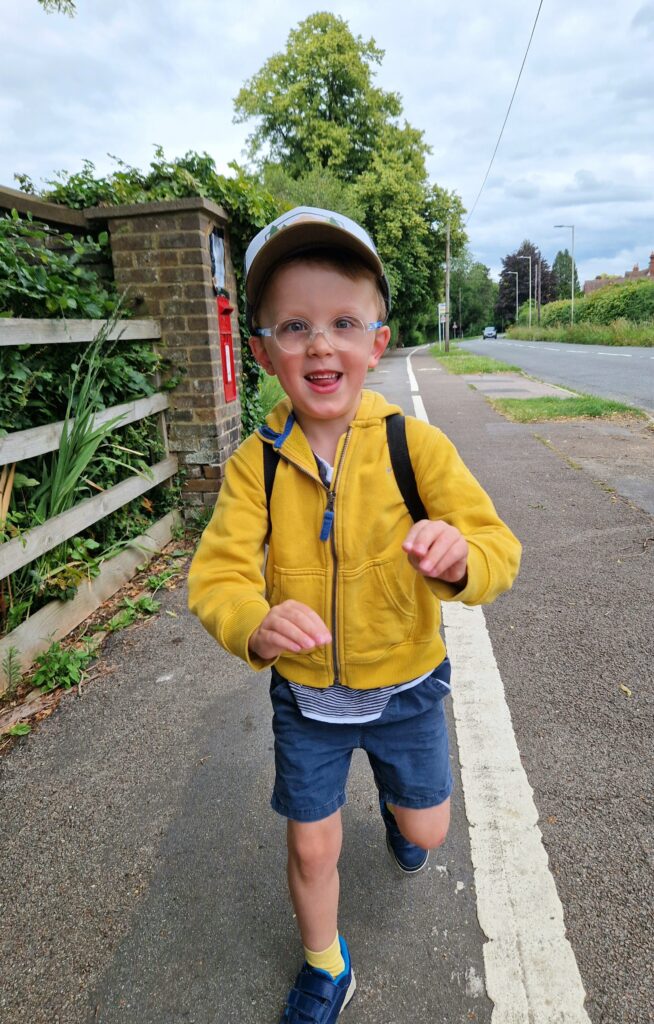The 100,000 Genomes project has seen some outstanding real-life impacts for people like Ben, aged five. We met with Ben’s mum Amanda to learn more about their story.
Ben had a relatively normal birth but his early weeks were challenging; he had trouble feeding and his weight dropped dramatically. He was a ‘floppy baby’ and very susceptible to infections. At just six weeks old, Ben had a cardiac arrest after contracting viral meningitis and bronchiolitis, for which he had to be resuscitated. When he recovered, he continued to experience developmental delays, with clinicians believing this was down to him “catching up” from his early health problems. He continued to make progress, but it was slow.
Ben was consistently in and out of the NHS system, with varying concerns such as breathing difficulties, infections, hearing problems, an eye squint, low muscle tone and communication difficulties. A fast-growing head circumference led to concerns about fluid on the brain, with MRI scans at both six and 18 months.
This 18 month scan ruled out hydrocephalus, but identified grey matter heterotopia, which can be associated with learning difficulties and epilepsy. As Ben continued to slowly progress, he was discharged by his consultant and moved into community care. Feeling there were still matters requiring investigation, Ben’s parents contacted his previous paediatrician, who booked Ben an appointment with a neurologist.
This neurologist offered to carry out a genetic test as part of the 100,000 Genomes Project to ascertain if a cause could be identified for the issues Ben was experiencing. At this time, Ben was four.
In December 2023, Ben’s results came back; he has an extremely rare mutation of the NF1X gene, which affects brain and muscle development. The diagnosis was not entirely straightforward, as depending on where the mutation is located along the gene it can cause Malan Syndrome or Marshall-Smith Syndrome, both extremely rare conditions with very few patients worldwide. The location of Ben’s mutation sits in an uncertain area in the middle.
Ben’s mum Amanda is a researcher, so she got to work looking into both conditions. Through her research, it became clear to her that Ben’s symptoms aligned perfectly with those observed in Malan Syndrome.
A follow up appointment with a Consultant Clinical Geneticist saw Amanda explain her findings, who agreed and had Ben’s genetic report rewritten to reflect this certainty. Ben then received an official diagnosis of Malan Syndrome, making him one of only around 300 people diagnosed with the condition globally. Malan syndrome was first identified in 2010 and is an overgrowth syndrome associated with intellectual disability, vision and/or hearing impairment, skeletal anomalies, epilepsy and anxiety.
Finally, Ben and his family had an answer. Whilst the diagnosis didn’t change Ben or his symptoms, it gave them access to a community, to information, to relevant benefits, and crucially, the ability to define his condition and talk about it, for example to family and friends, educators and medical professionals, and to Ben’s sister to explain why her little brother can’t talk.
There is an international Malan Syndrome Foundation that has produced a two-page professional guide which the family can now take to medical appointments, educational providers, and other such services to explain Ben’s symptoms. Amanda stated, “This is such a simple but incredibly useful resource to explain this ultra-rare condition and to ensure the right investigations and medical disciplines are involved.”
Amanda is now part of a support group for those affected by Malan Syndrome. The family have learnt so much about the condition through this community and travelled to the USA in July for the second Malan Syndrome conference. While there are no treatments, the Foundation has been active in raising money and supporting early research to enhance understanding of Malan Syndrome, potential pathways to treatments and, maybe one day, a cure.
At age 5, Ben is a very happy, sociable and playful boy who enjoys school immensely, and his friends and teachers very much enjoy him! Ben is non-verbal and communicates with signing, but has really engaged with phonics and numbers in his mainstream school, and is always making progress.
Amanda stated: “Had Ben’s neurologist never suggested genetic testing, we would still be in the dark, slowly coming to terms with the fact Ben may never “catch-up” but having no explanation as to why”.
“The diagnosis explains his difficulties and connects a whole lot of other complications that all just felt so unlucky. The diagnosis brings answers which is good, but also a permanency to the situation which has been hard. Nonetheless, the diagnosis has given us critical information about our son and information is power. Already, it has given us the language to talk about Ben and his needs, access to the right medical teams that need to monitor him and look out for complications we now know about, access to some funding to support his extra care and therapies, and – most importantly – access to a community of other families like ours. With such an ultra-rare condition, learning from the lived experiences of others is by far the most helpful source of information, ideas, expectations and also companionship.”

